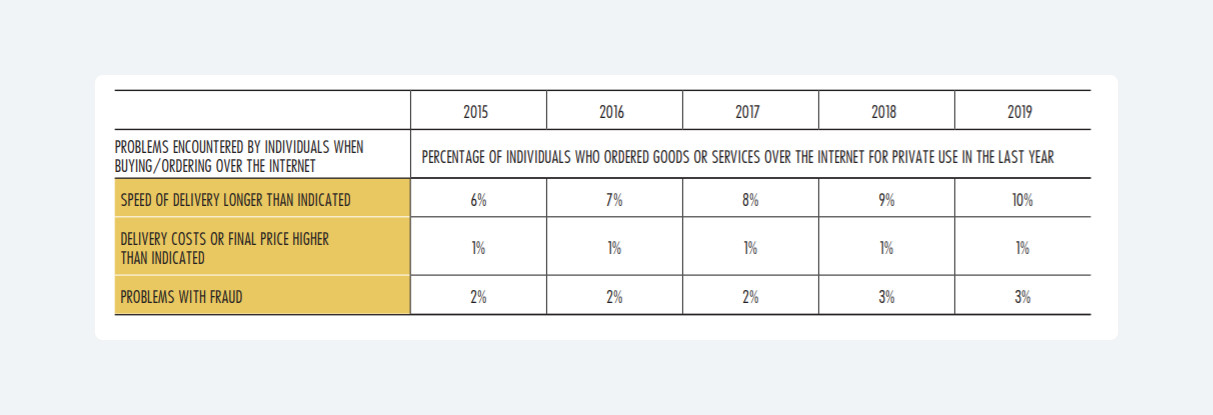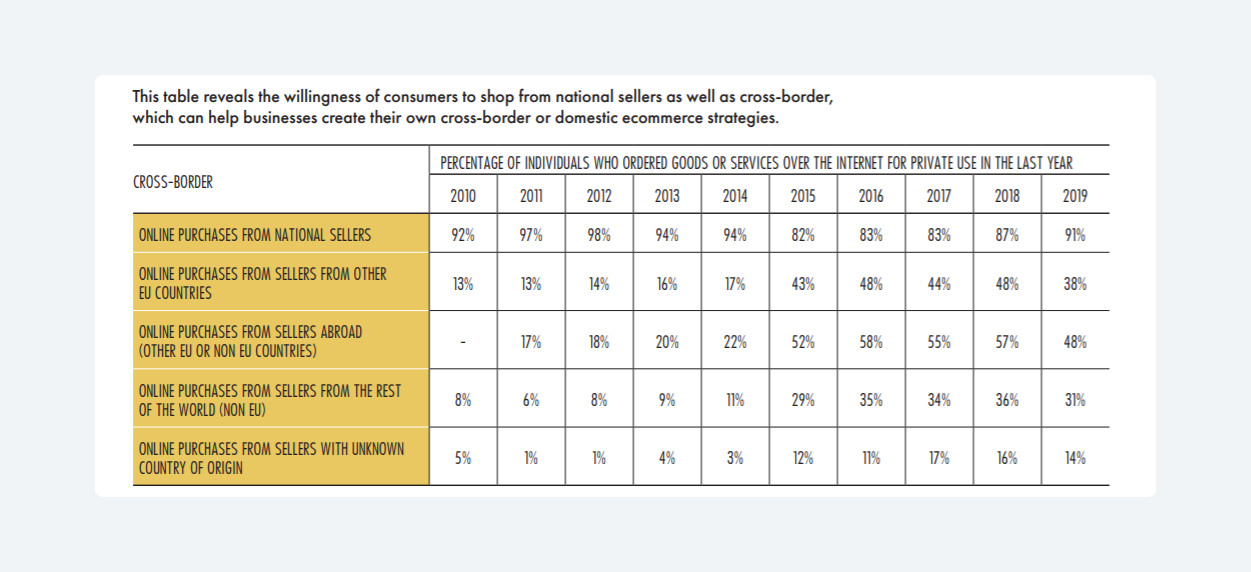Consumer data problems: Germany 2020 Ecommerce Country Report
Written by
Kinga EdwardsPublished on

Despite the dynamic development, e-commerce is still a new thing. New e-commerce stores may have problems with the proper use of the potential offered by this market. Also, customers may not completely find themselves in a relatively new shopping situation.
Based on the Germany 2020 Ecommerce Country Report, we covered the problems that customers who do shopping online may encounter.
What bothers German consumers – problems
Regarding the problems that consumers encounter when shopping online, it’s best to analyze them over the years. Why? Because over time, consumers’ attitudes to some aspects of online shopping change, as well as sales strategies of sellers.
The table below presents the most common problems encountered by Germany. As you can see, Germans are getting more upset about longer than the expected delivery time and also fraud aspect. Longer delivery time may be caused by more and more orders to realize.
Stores and courier companies are overwhelmed by the amounts of orders, especially at such time of year as Christmas or Black Friday. But it is not an excuse for German consumers.
Despite the very well-developed logistics infrastructure, delivery is still an inconvenience for a small percentage of the population. In Germany, DHL (a subsidiary of the national post office), Hermes and DPD operate at a very high level. Difficulties may be caused by the fact that home delivery is the most preferred delivery option.
This is the most demanding method because couriers have to agree with each recipient of the package, whether anyone will be present at the address indicated. It takes time. The good news is that Germany is more and more convinced of other methods such as click and collect.

As you can see the cost of delivery bother German, but only 1% of them. And over time this problem has not escalated. Most of Germans prefer to pay extra for the quality of products or services provided then to save on worse quality.
The higher quality of the final product is the more satisfied the German get. If, for example, there is an ability to insure a particular purchase while travelling, a German customer will most likely do it.
What bothers German consumers – barriers
It’s time to discuss the shopping barriers, which most often keep Germans away from online shopping. One of the biggest is the clear preference for shopping in brick and mortar stores.
This is understandable, especially if you look at this aspect from the angle of German character. German consumers want to know exactly what they are spending money on, so, logically, they prefer to see or test the item live before paying for it.
Security concerns are other barriers. Here, not only the parcel’s safety but mainly data comes into play. Germans do not like to provide their data on the Internet, which is why they rarely set up accounts in online stores.
Although some of them pay with cards online or choose online payments, it is very likely that if they find two stores and only one offers payment on delivery or invoice, they will choose this one.
Security issues are very important for Germans. They are aware of their rights on the Internet and know what GDPR is about.

Germans like to return their purchases. Over 12 per cent of online purchases are sent back to the seller. And this can become a barrier while buying online.
It is much easier and faster to go to the store and return the item than order a courier, complete formalities and wait for a money refund.
It is quite understandable, especially for German society who appreciates efficient settlement.
All of the above barriers lose their relevance from year to year, which may mean that either Germany is becoming more open or stores are adapting the level of security and facilities to customer requirements. Or both.
What bothers German consumers – cross-border shopping
As we already know, Germany is a rather distrustful nation. That is why cross-border shopping is a challenge for them. They prefer that the pages on which they shop are in German. The countries most often Germany makes purchases from are the European Union and the USA.
Shopping preferences in this context are very well illustrated by the list of 10 most popular e-commerce in Germany. German stores dominate in it. However, the American retail giant Amazon ranks first.
Why? Because it made sure to meet the requirements of the Germans. German domain, warehouses throughout the country – the average consumer feels as if he was ordering from a German store.

As the table above presents, Germans are getting more open to cross-border shopping, not only from UE countries but also these from outside the Union.
To wrap up
German consumers are quite demanding. Their requirements for payment methods, delivery and security rules are quite high.
The German e-commerce market has a lot to offer; however, it requires extensive preparation and appropriate research. Depending on the industry, the rate of return can range from 5% -10% in the fashion sector to as much as 70% in the electronics sector.
When thinking about expansion into the German market, it is also worth considering other German-speaking countries such as Austria and Switzerland. It increases the chance of your business’s success.


